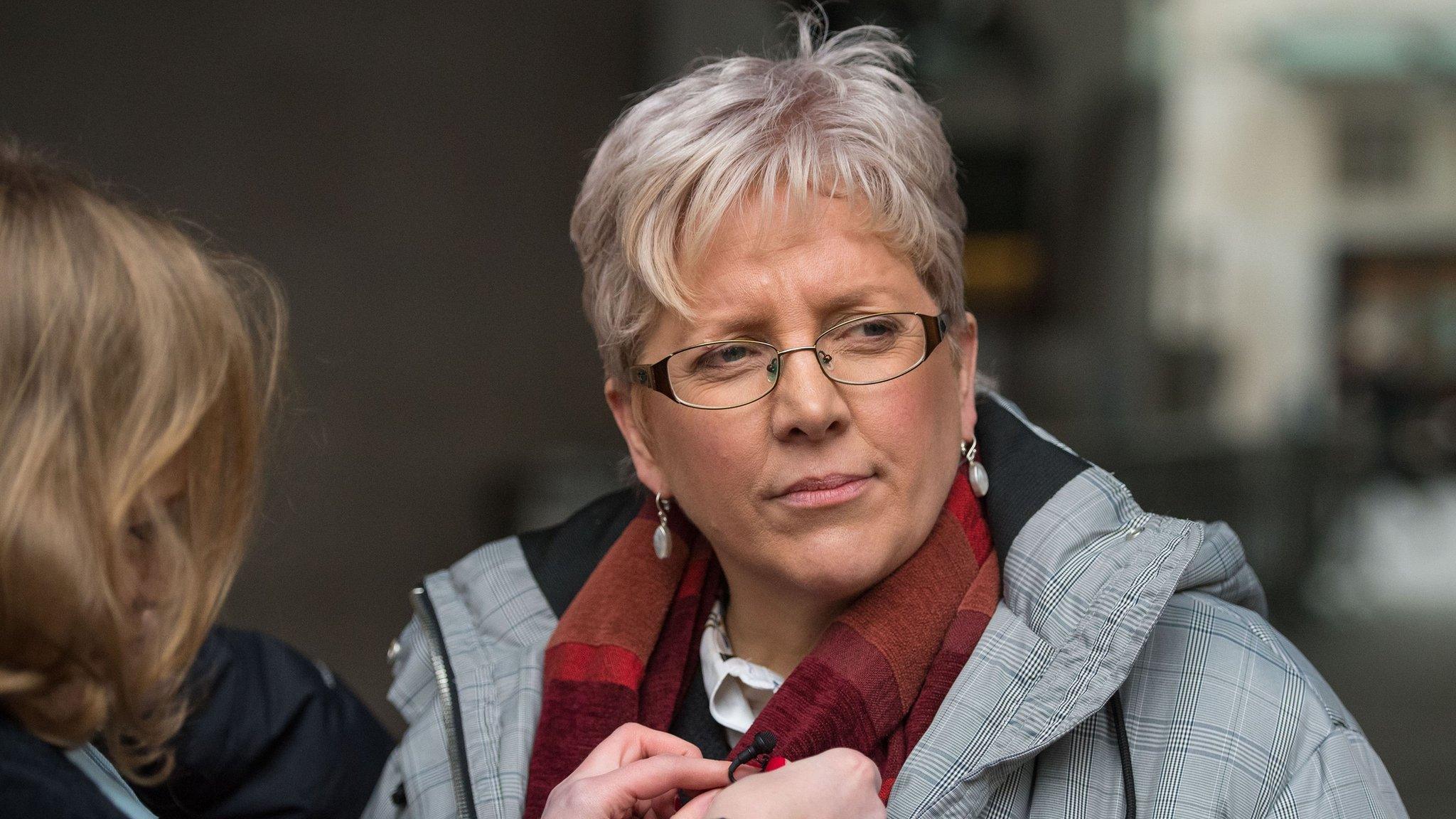What is equal pay and how can you find out if you are getting it?
- Published

The BBC has been cleared of unlawful acts of pay discrimination against women, following an investigation by the Equalities and Human Rights Commission (EHRC).
But it was warned it needed to make "improvements to increase transparency and rebuild trust with women at the organisation".
So what exactly is equal pay, and how can you find out if you are not being paid enough?
What is equal pay?
Equal pay is the legal right for men and women to be paid the same for:
Doing the same, or similar, jobs
Doing work that has been rated as "equivalent", or in the same grade
Doing work of "equal value", where jobs might be different but require a similar level of skill
Pay does not just refer to salaries. It also includes employee benefits like holidays and pension contributions, as well as company cars and bonuses.
It has been part of UK law since the 1970 Equal Pay Act, and is now also part of the Equality Act 2010. It means all employees are entitled to equal pay, regardless of whether they are on full-time, part-time, or temporary contracts.
What is the equal pay problem at the BBC?
Carrie Gracie's statement after BBC apologises for unequal pay
The EHRC investigation started in March 2019 after several high-profile cases involving pay discrimination at the BBC.
The BBC's China editor Carrie Gracie resigned from her role in January 2018 because two male international editors earned "at least 50% more" than her. The BBC later apologised
Later that month, six leading male presenters agreed to take pay cuts
In January, Newswatch presenter Samira Ahmed successfully argued that Jeremy Vine was paid more than six times her salary for similar work on Points of View
In the same month, radio presenter Sarah Montague confirmed she won a £400,000 settlement and an apology after being treated "unequally" over pay
The commission, said the BBC accepted that "its historical practices were not fit for purpose and has made significant changes since 2015".
More than 500 women have been awarded rises since 2017 after making complaints. The corporation said most related to the issue of fair pay rather than equal pay.
How do I find out if I am being paid equally?
Discussing pay with colleagues can be awkward, but can be a good start in finding out if you are being paid equally.
Monitoring salary ranges in your employer's job adverts, or finding out the typical rate for similar jobs in the same industry can also help.

The Advisory, Conciliation and Arbitration Service (Acas) provides impartial advice to workers and bosses. It says any employee who suspects they are not receiving equal pay, external can ask their manager to explain any pay difference.
An employer may be able to defend a claim if they prove the reason for the difference is because of a genuine factor and not based on the employee's sex.
How do I claim equal pay?
An employee can try to resolve the issue first with their boss or HR. They could also raise a grievance, which is a formal complaint.
If that doesn't work, they can complain to an employment tribunal, independent bodies which assess work-related legal claims. But the claimant must first contact Acas, which offers a voluntary early conciliation procedure, external to try to resolve things without a tribunal.
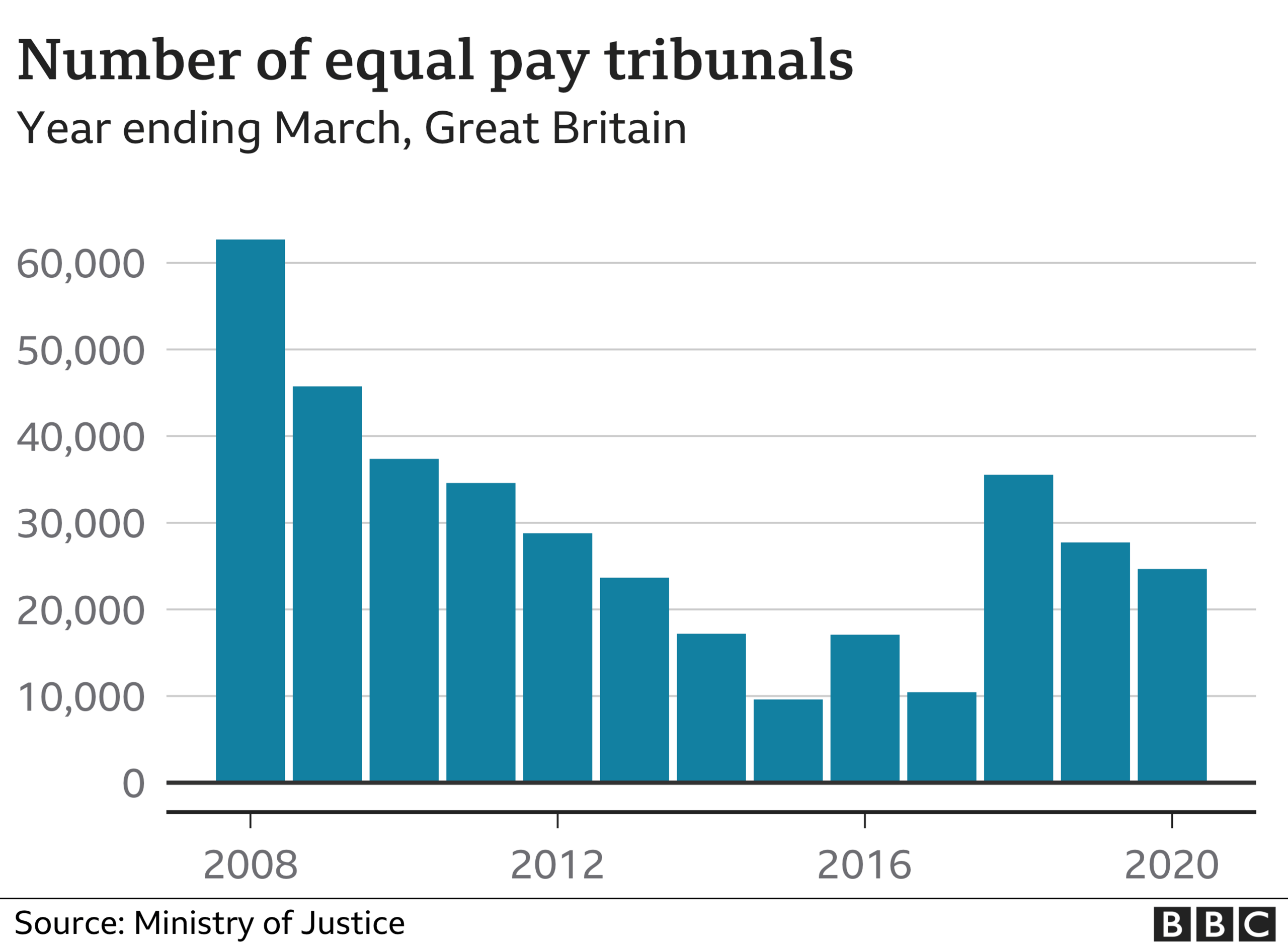
An equal pay claim can go to a tribunal up to six months after leaving the role. There are no fees, but if you pay for a lawyer that could be expensive.
The person bringing the claim must point to a "comparator". That is, someone of the opposite gender currently or previously working for the same employer, doing the same or equivalent work and receiving more pay or benefits.
The tribunal can order contracts to be amended, compensation, or up to six years' back pay to be awarded to the employee.
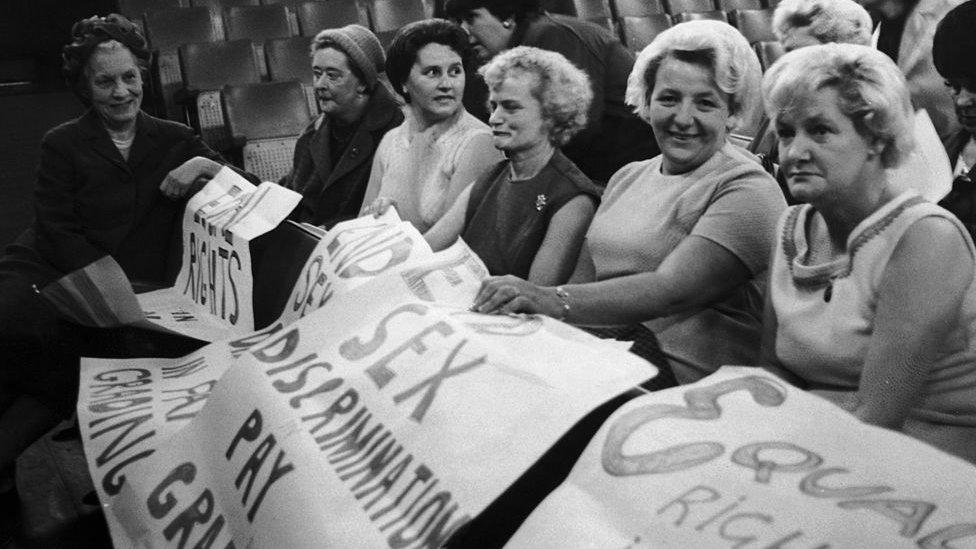
The Ford machinists' strike in Dagenham became a celebrated moment in the campaign for equal pay
However, cases are not solved very often at tribunal. That is partly because demonstrating different jobs are of equal value can be a difficult and drawn-out process.
Lisa Ayling, solicitor and employment law specialist, says many cases are settled before a tribunal is needed.
She adds: "Women are more tempted to settle equal pay than other claims because they realise the legal hurdles to overcome are complex, time-consuming and expensive."
What famous cases have there been?
Last year, Glasgow City Council agreed to pay out a reported £548m to compensate thousands of women who were paid less than men in jobs of the same grade.
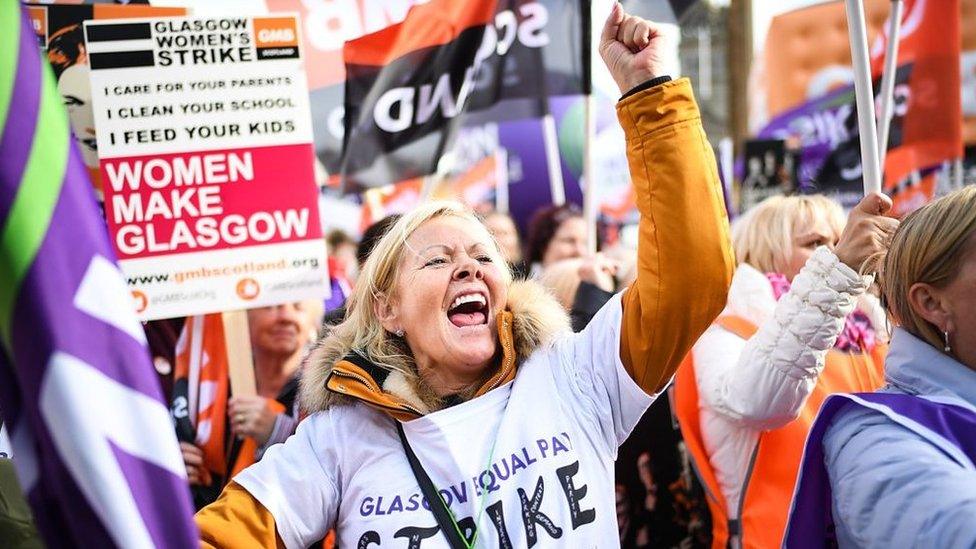
Thousands of women marched in Glasgow in one of the UK's biggest equal pay strikes
More than 8,000 women employed in schools, nurseries and in cleaning and catering services by the council had been on the biggest-ever equal pay strike in the UK.
Supermarket Asda also lost an appeal in a long-running legal dispute over equal pay in January.
The decision meant that lower-paid shop staff, mostly women, can compare themselves with higher-paid warehouse workers, who are mostly men.
Is equal pay the same as the gender pay gap?
No. Equal pay is awarding men and women the same amount to do identical or equivalent work, and is a legal requirement for businesses.
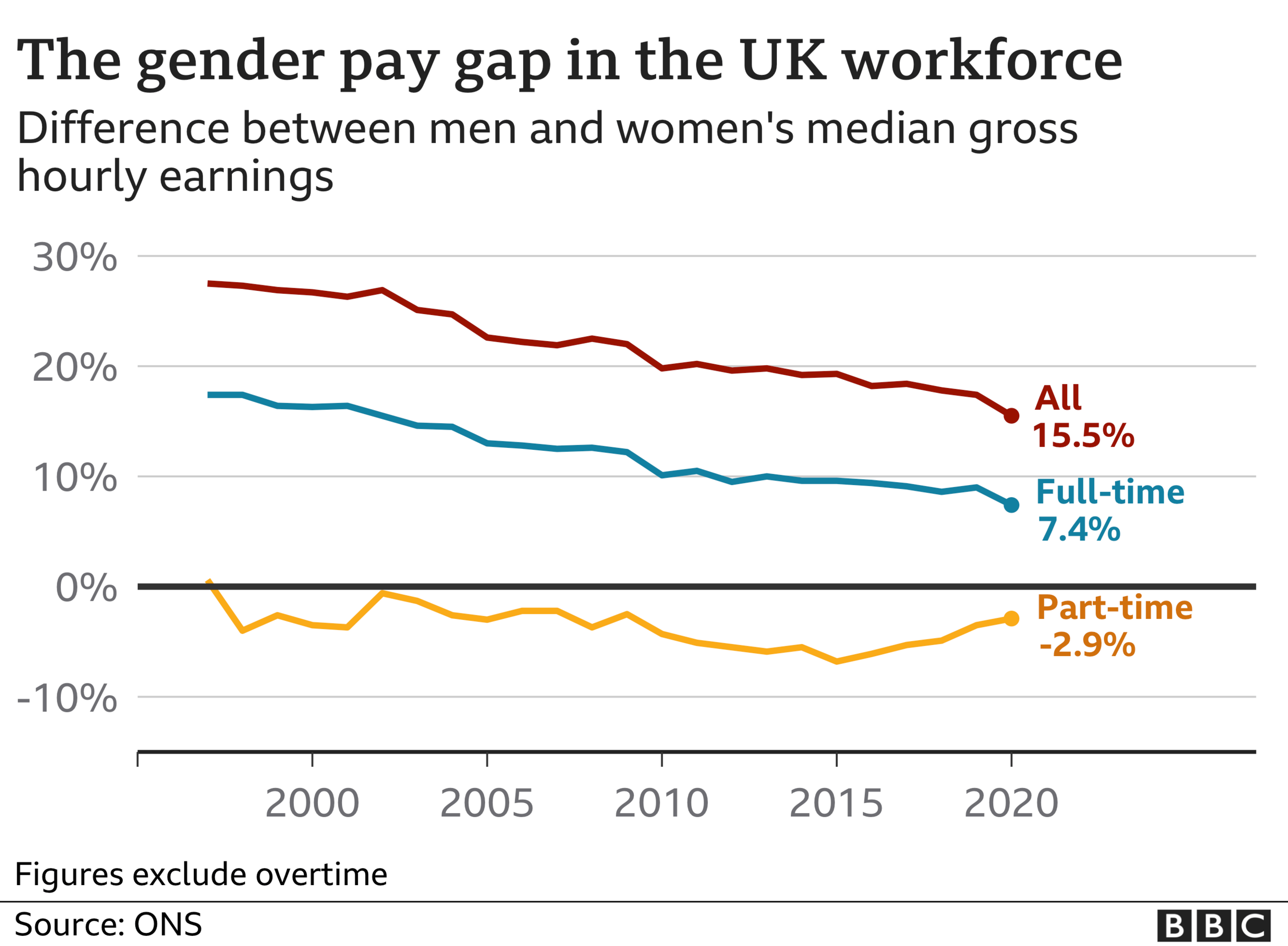
The gender pay gap refers to the percentage difference between average hourly earnings for all men and women in a company, sector or across the country. If women are being paid more, that's called a negative pay gap.
Having a gender pay gap is not illegal, but it is compulsory for all UK employers with more than 250 workers to publish their gender pay gap data.
- Published12 November 2020
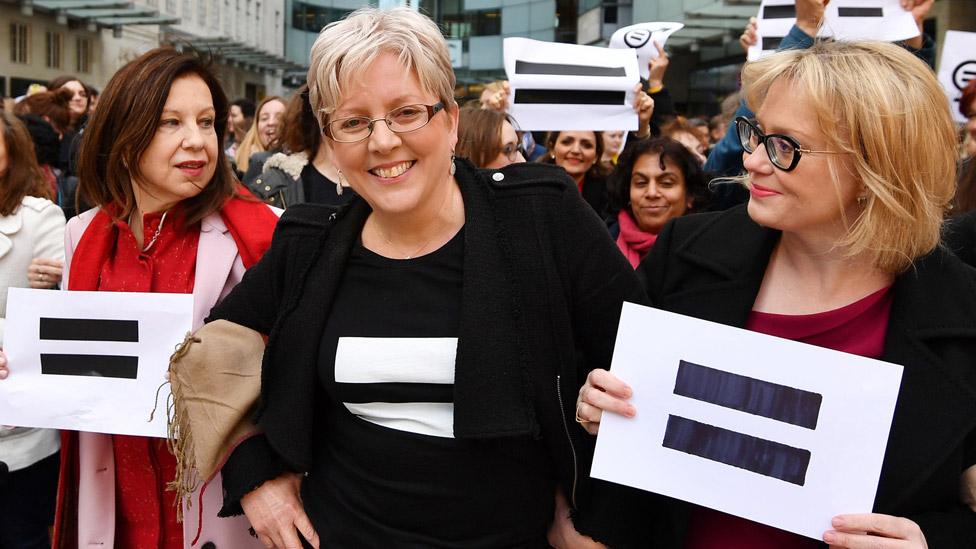
- Published21 October 2019

- Published5 April 2019
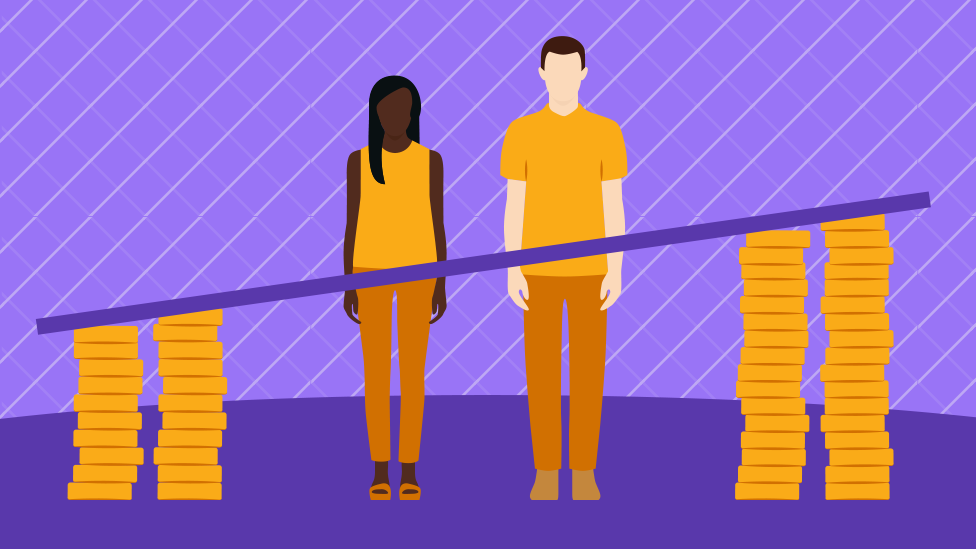
- Published8 January 2018
